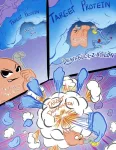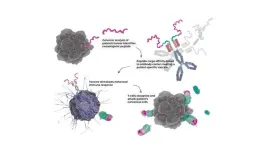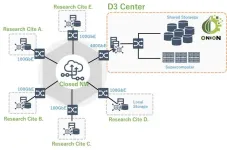(Press-News.org) RIVERSIDE, Calif. -- In drug discovery, targeted protein degradation is a method that selectively eliminates disease-causing proteins. A University of California, Riverside team of scientists has used a novel approach to identify protein degraders that target Pin1, a protein involved in pancreatic cancer development.
The team reports today in the Proceedings of the National Academy of Sciences that it has designed agents that not only bind tightly to Pin1 but are designed to cause its destabilization and cellular degradation — a finding that could pave the way for new cancer therapies.
Led by Maurizio Pellecchia, a professor of biomedical sciences in the UCR School of Medicine, the team found that the degraders, which were made in the lab, act like “molecular crowbars” that open up the structure of Pin1, rendering it less stable.
“This ‘molecular crowbar’ strategy is potentially a promising method in drug discovery and pharmacology,” said Pellecchia, who holds the Daniel Hays Chair in Cancer Research at UCR. “Our agents targeting Pin1 not only potently bind to Pin1 but also destabilize it and this destabilization leads to its degradation across various human cancer cell lines. This strategy could offer an additional pathway for developing agents that can more effectively target and degrade harmful proteins.”
The researchers’ interest in studying Pin1 was two-fold. They wanted to identify potent molecules that could degrade Pin1. They also wanted to study the role of Pin1 in the crosstalk between pancreatic cancer cells and the tumor microenvironment — macrophages and cancer-associated fibroblasts — where Pin 1 is also expressed. Macrophages are a type of white blood cell. Cancer-associated fibroblasts are cells that play a key role in the development and progression of tumors.
Pin1 is a fast-acting enzyme involved in many cellular processes and implicated in the formation of tumors. It is overexpressed in many tumors and its deficiency significantly suppresses cancer progression. Its expression level is much higher in cancer-associated fibroblasts and in pancreatic cancer cells.
“Pancreatic cancer is particularly difficult to treat because a highly fibrous tissue covers pancreatic cancer cells,” Pellecchia said. “As a result, it is difficult for treatments to reach the pancreatic cancer cells effectively. We want to understand the crosstalk between cancer-associated fibroblasts and pancreatic cancer cells. We believe Pin1 may play a major role in this cross talk.”
Pellecchia explained that if his team can kill cancer-associated fibroblasts through Pin1 inhibition, then it is possible that pancreatic cancer cells will be more susceptible to anticancer agents. The difficulty until now, Pellecchia said, has been how to obtain potent and selective Pin1 inhibitors that can penetrate cancer-associated fibroblasts and/or cancer cells and, at the same time, block the function of Pin1, possibly eliminating Pin1 altogether by inducing its degradation.
“Our molecular degrader, the ‘crowbar,’ opens up the structure of Pin1, its target,” Pellecchia said. “We are excited about this mechanism because we believe it’s unique and could be applicable to other drug targets. Inducing its cellular degradation is a much more effective way to counteract the activity of an overexpressed oncogenic enzyme than simply inhibiting it.”
Pellecchia is collaborating with researchers at the City of Hope under a National Cancer Institute collaborative grant that addresses health disparities in cancer research. The effort will assess how well the molecular degraders Pellecchia’s team identified inhibit cancer-associated fibroblasts in patients affected by pancreatic cancer and other gastrointestinal cancers.
“Our collaboration would like to see if we can administer these agents to pancreatic cancer patients or other patients that develop peritoneal metastasis, which is often associated with cancer-associated fibroblast activity,” Pellecchia said. “Ultimately, we hope to develop our agents into novel cancer therapeutics in this collaboration.”
According to Pellecchia, it may be possible for pharmaceutical companies to develop therapeutics that can cause both destabilization of the target and its degradation.
“This is a new potential target modality for future drugs,” he said. “Also, Pin1 inhibitors that can cause Pin1 degradation very effectively could have a major impact in a number of cancers, and not just pancreatic cancer, because of their effect on cancer-associated fibroblasts.”
Pellecchia was joined in the research by Giulia Alboreggia, the first author of the paper, and Parima Udompholkul, who work in his laboratory; and Isaac Rodriguez and Gregor Blaha. Rodriguez works in Blaha’s laboratory.
The research was supported in part by grants from the National Institutes of Health.
The title of the paper is “Targeted Degradation of Pin1 by Protein Destabilizing Compounds.”
The University of California, Riverside is a doctoral research university, a living laboratory for groundbreaking exploration of issues critical to Inland Southern California, the state and communities around the world. Reflecting California's diverse culture, UCR's enrollment is more than 26,000 students. The campus opened a medical school in 2013 and has reached the heart of the Coachella Valley by way of the UCR Palm Desert Center. The campus has an annual impact of more than $2.7 billion on the U.S. economy. To learn more, visit www.ucr.edu.
END
Protein degradation strategy offers new hope in cancer therapy
UC Riverside researchers say ‘molecular crowbar’ strategy is a promising method in drug discovery
2024-11-11
ELSE PRESS RELEASES FROM THIS DATE:
Mental fatigue leads to loss of self-control by putting brain areas to sleep
2024-11-11
Prolonged mental fatigue can wear down brain areas crucial for the individual ability to self-control, and cause people to behave more aggressively.
In a new multidisciplinary study published in the PNAS, a group of researchers from neuroscience and economics at the IMT School of Advanced Studies Lucca links the debated concept of "ego depletion", that is to say the diminution of willpower caused by previous exploitation of it, to physical changes in the areas that govern executive functions in the brain. In particular, the ...
Was ‘Snowball Earth’ a global event? New study delivers best proof yet
2024-11-11
Geologists have uncovered strong evidence from Colorado that massive glaciers covered Earth down to the equator hundreds of millions of years ago, transforming the planet into an icicle floating in space.
The study, led by the University of Colorado Boulder, is a coup for proponents of a long-standing theory known as Snowball Earth. It posits that from about 720 to 635 million years ago, and for reasons that are still unclear, a runaway chain of events radically altered the planet’s climate. Temperatures plummeted, and ice sheets that may have been several miles thick crept over every inch of Earth’s surface.
“This study presents the first physical evidence ...
Scientists issue call to action underlining importance of microbial solutions to tackle climate crisis
2024-11-11
Ahead of COP29, Applied Microbiology International (AMI) has partnered with leading global scientific organisations to issue a unified call to action, spotlighting microbial solutions as pivotal in combating climate change.
In a strategic publication, released in multiple high-impact scientific journals at once, the joint paper advocates for the establishment of a global science-driven climate task force. This initiative aims to expedite the deployment of microbiome technologies, providing stakeholders worldwide with access to effective and immediate solutions.
Signatories of the paper, ‘Microbial solutions must be deployed against the climate catastrophe’ ...
Ochsner Transplant Institute among site collaborators in New England Journal of Medicine HIV-to-HIV kidney transplant study
2024-11-11
NEW ORLEANS – The Ochsner Transplant Institute served as one of 26 U.S. transplant centers collaborating in an HIV-to-HIV kidney transplant study published by The New England Journal of Medicine (NEJM). The article, Safety of Kidney Transplantation from Donors with HIV, details findings supporting HIV-to-HIV kidney transplants as safe and just as effective as those using organs from donors without HIV.
Human immunodeficiency virus, commonly known as HIV, attacks cells in the body that fight infection and there is currently no known cure. In the U.S.,1.2 million people are living with HIV. According to the National ...
Scientists call for global action on microbial climate solutions
2024-11-11
Washington, D.C. — Nov. 11, 2024 — Today, leaders from scientific societies, institutions and publishing bodies issued an urgent call for the global community and governments to take immediate and decisive emergency climate action. This appeal is made through an editorial published in mSystems, released on the opening day of the 2024 United Nations Climate Change Conference (COP29). Key contributors to this initiative include Virginia Miller, past president of the American Society for Microbiology (ASM); Jack Gilbert, Editor-in-Chief of mSystems; and Jay Lennon, ...
New antibody could be promising cancer treatment
2024-11-11
Researchers at Uppsala University and KTH Royal Institute of Technology have developed a new form of precision medicine, an antibody, with the potential to treat several types of cancer. Researchers have managed to combine three different functions in the antibody, which together strongly amplify the effect of T cells on the cancer tumour. The study has been published in Nature Communications.
Researchers have developed a unique type of antibody that both targets and delivers a drug package via the antibody itself, while simultaneously activating the immune system (“3-in-1 design”) for personalised immunotherapy treatments.
“We ...
The public implications of private substitutes for electric grid reliability
2024-11-11
Climate change events have, in recent years, placed increasing strain on public electrical grids in the United States. In response to this vulnerability, some consumers are turning to private alternatives to the electric utility, like generators and batteries. A new paper in the Journal of the Association of Environmental and Resource Economists studies who adopts these private alternatives and how adoption responds to grid failures. The paper also studies how public electric grid reliability may change due to this proliferation and how these changes will affect the wellbeing of all households.
In ...
Religiosity, spirituality, and meaning-making generally associated with lower suicidality
2024-11-11
November 11, 2024 — All aspects of religiosity, spirituality, and meaning-making (R/S/M) relate to suicidality in people with a psychiatric diagnosis or a recent suicide attempt, according to a systematic review and meta-analysis published in Harvard Review of Psychiatry, part of the Lippincott portfolio from Wolters Kluwer.
"Protective dimensions seemed to exert relatively stable effects across different religions and life views," Bart van den Brink, MD, PhD, of the Department of ...
Eife studying legal surveillance as social determinant of health
2024-11-11
Erin Eife, Assistant Professor, Criminology, Law and Society, College of Humanities and Social Sciences (CHSS), received funding for the project: “Surveillance as a Social Determinant of Health: Understanding the Impact of Pending Charges on Health Outcomes.”
Eife will conduct this research under the advisement of Evan Lowder, Associate Professor, Criminology, Law and Society, College of Humanities and Social Sciences (CHSS), and Lauren Brinkley-Rubinstein, Associate Professor in the Department of Population Health Sciences at Duke University.
Eife aims to produce knowledge about ...
Newly developed 100Gbps data transfer system for accelerating Open Science through industry-university collaboration in Japan
2024-11-11
Tokyo & Osaka, Japan – Osaka University and NEC Corporation (NEC; TSE: 6701) are moving forward with efforts to realize a data infrastructure supporting Open Science. In 2021, The Joint Research Laboratory for Integrated Infrastructure of High Performance Computing and Data Analysis was established within the D3 Center, Osaka University (Director: Professor Susumu Date*1) by Osaka University and NEC. The result of the Joint Research Laboratory will be showcased at the International Conference for High Performance Computing, Networking, Storage, and Analysis (SC24) scheduled ...
LAST 30 PRESS RELEASES:
Jeonbuk National University researchers develop an innovative prussian-blue based electrode for effective and efficient cesium removal
Self-organization of cell-sized chiral rotating actin rings driven by a chiral myosin
Report: US history polarizes generations, but has potential to unite
Tiny bubbles, big breakthrough: Cracking cancer’s “fortress”
A biological material that becomes stronger when wet could replace plastics
Glacial feast: Seals caught closer to glaciers had fuller stomachs
Get the picture? High-tech, low-cost lens focuses on global consumer markets
Antimicrobial resistance in foodborne bacteria remains a public health concern in Europe
Safer batteries for storing energy at massive scale
How can you rescue a “kidnapped” robot? A new AI system helps the robot regain its sense of location in dynamic, ever-changing environments
Brainwaves of mothers and children synchronize when playing together – even in an acquired language
A holiday to better recovery
Cal Poly’s fifth Climate Solutions Now conference to take place Feb. 23-27
Mask-wearing during COVID-19 linked to reduced air pollution–triggered heart attack risk in Japan
Achieving cross-coupling reactions of fatty amide reduction radicals via iridium-photorelay catalysis and other strategies
Shorter may be sweeter: Study finds 15-second health ads can curb junk food cravings
Family relationships identified in Stone Age graves on Gotland
Effectiveness of exercise to ease osteoarthritis symptoms likely minimal and transient
Cost of copper must rise double to meet basic copper needs
A gel for wounds that won’t heal
Iron, carbon, and the art of toxic cleanup
Organic soil amendments work together to help sandy soils hold water longer, study finds
Hidden carbon in mangrove soils may play a larger role in climate regulation than previously thought
Weight-loss wonder pills prompt scrutiny of key ingredient
Nonprofit leader Diane Dodge to receive 2026 Penn Nursing Renfield Foundation Award for Global Women’s Health
Maternal smoking during pregnancy may be linked to higher blood pressure in children, NIH study finds
New Lund model aims to shorten the path to life-saving cell and gene therapies
Researchers create ultra-stretchable, liquid-repellent materials via laser ablation
Combining AI with OCT shows potential for detecting lipid-rich plaques in coronary arteries
SeaCast revolutionizes Mediterranean Sea forecasting with AI-powered speed and accuracy
[Press-News.org] Protein degradation strategy offers new hope in cancer therapyUC Riverside researchers say ‘molecular crowbar’ strategy is a promising method in drug discovery




